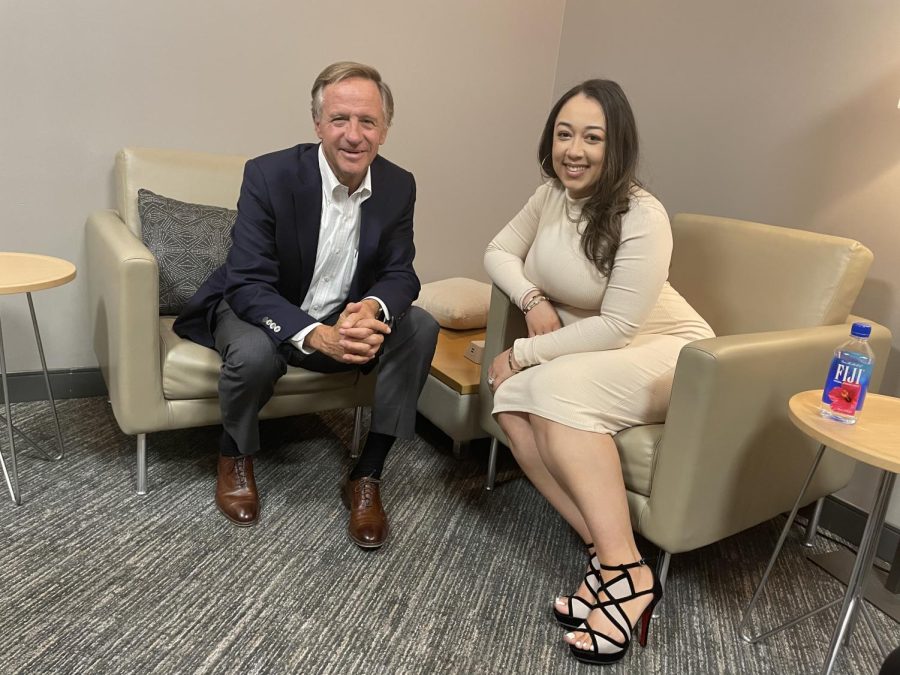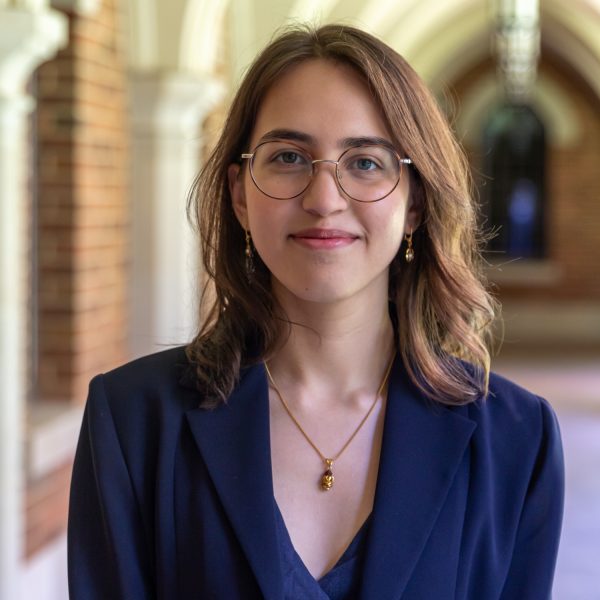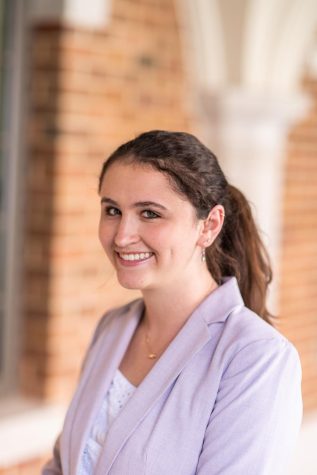Editor’s Note: This piece contains mention of sex trafficking and murder.
The Vanderbilt Project on Unity and American Democracy hosted Cyntoia Brown and Former Governor Bill Haslam on campus on March 15 to discuss restorative justice and mercy. The event was moderated by law and psychiatry professor Chris Slobogin.
Brown is a survivor of child sex-trafficking who was sentenced to life in prison at age 16 for killing 43-year-old Johnny Allen, who solicited sex from her. Brown’s case garnered national attention with the release of the Netflix documentary, “Murder to Mercy: The Cyntoia Brown Story,” and support from celebrities, such as Rihanna and LeBron James. In 2019, Haslam, who served as the governor of Tennessee at the time, granted Brown clemency, commuting her sentence to 15 years.
At the start of the event, Brown spoke about how her early years led to her ending up in an “orange jumpsuit” by age 16. She said she always struggled in school and was placed in state custody at 13 years old. She then moved through different residential treatment centers, which she said focused very little on actual treatment beyond medication; she was “living on the streets of Nashville” by the time she turned 16, where she met a pimp known as “Kut Throat,” who began trafficking her.
After Brown was arrested for killing Allen, her case was transferred to adult court in Tennessee, despite her being a minor. Slobogin noted that there is a lot of debate around trying children as adults and on the merits of rehabilitation and leniency in juvenile courts. He explained that human brains do not reach full maturity until the age of 25, and the Supreme Court supports that no one under the age of 18 should receive the death penalty or life without parole.
While in prison, Brown said she was “constantly fighting against helplessness.” She emphasized that it is imperative that those who have been affected by the criminal justice system be included in policy reform from the outset. Haslam agreed that clemency only provides a short-term solution to the criminal justice reform crisis and said Brown’s case afforded him a better understanding of how children are treated in the court system and of sex trafficking.
Haslam said he and Brown grew up “in different worlds,” despite having grown up in the same place. He said his first interaction with the state was getting his driver’s license; yet, many children like Brown already had numerous interactions with state institutions by the same age.
In his time in office, Haslam said he regrets not using his clemency power until the end of his term. He said Brown’s case came across his desk close to the end of his term, but he said his decision felt “clear” the minute he became acquainted with the specifics of her story.
Haslam said his decision to grant Brown clemency was complicated by the fact he did not want to treat Brown differently due to her case garnering national attention. Ultimately, he said he knew releasing her was the right thing to do, and didn’t want to let the national attention cloud that realization.
Throughout their conversation and The Hustler’s interview, Haslam and Brown touched on the future of criminal justice reform, the importance of faith in their lives and their connected stories.
Vanderbilt Hustler [to Haslam]: How did you come to know about Brown’s case, and what motivated you to grant her clemency?
Haslam: I got to know about her case because you couldn’t help but not. Once the documentary of Cyntoia was on air, it attracted so much attention from Snoop Dogg and LeBron James and others—they have a few more followers on Twitter than I do—so when they start sending out messages, you start hearing the response, and our office literally got flooded. I had heard about Cyntoia before, but you couldn’t miss it after that. So that was the first time we looked at it.
Three or four factors [were why we decided to grant her clemency]. Number one, what she was sentenced for and the way she was sentenced, we wouldn’t do now—we’ve learned a lot. We have a different understanding of sex trafficking than we did then and what it involves.
Also, there was a sense, at least for me, that sentenc[ing] a juvenile to that long of a mandatory sentence—in the case of somebody who, it felt like to me, was ready to be back in society—just felt wrong. The last thing is Cyntoia had done a lot of things for herself—she had gotten her college degree. Our worlds had started to overlap some, and a lot of people that had gotten to know her while she was in prison were people who I knew and respected, and [they] vouched for her and her character.
[To Brown] How did it feel to first get that life sentence, but then to later find out that your sentence had been commuted to 15 years?
Brown: It was devastating; I was 16 years old; I didn’t have a license; I had never been to prom or homecoming or anything like that—so now you’re telling me that my life is just over? I felt like, throughout the whole process, I really didn’t have a voice in it. Even if I did say anything, no one would really hear me out,so I felt helpless. But then there was something in me that was really resistant, like ‘I’m not going to do that.’ My attorney had sat down with me after I was convicted, and he was like, you have two choices: you can give up, lay down [and] go crazy when you get in there. Or you can take every single class they put before you, and you can do everything you can do to rehabilitate yourself—don’t rely on the prison system to do it. Then, you can hope that someone will want to give you a second chance. That’s literally everything that I was fighting for those 15 years.
It felt like heaven [to find out my sentence had been commuted to 15 years]. It was incredible when you know how much went into that. I’m sitting here with [Governor Haslam] now, but my husband and I prayed for this man’s heart to be touched and just to see how God did that, and in such a major way, was like wow. It was incredible, not just because I was gonna be free, but because I got to see God’s hand.
Haslam: One of the fun things for me about this whole story is our lives intersect with others all the time. I mean, today your life has intersected with a whole lot of other folks. In this case, we had a big decision to make. She’s praying about the decision. We’re thinking about it, praying we’ll make the right decision, and when it was done and now that we’ve become friends, you get to see the other side of the tapestry.
You know, a tapestry gets woven together; you don’t get to see the other side; you just get to see your part. But when it’s over, one of the things that is satisfying about becoming friends is seeing what this story looked like from where you [Cyntoia] were.
[To Brown] Since 2019, you’ve written a book and begun a nonprofit organization to support other victims. What has been the most valuable experience in your time after incarceration?
Honestly, not just through our nonprofit, but even traveling around and speaking to different agencies—really connecting with young people, young girls who have heard my story and connected with it in some kind of way, really just having those moments. I’ve gotten to do some really cool things—like this [event] is a really cool thing—but just having that time to be with young girls and really just connect with them [and] mentor them is the coolest and most rewarding part to me.
[To Haslam]: Looking at the issue more broadly, what are your thoughts on criminal justice reform in Tennessee, specifically?
[Haslam] That’s kind of what we’re going to talk about tonight. But one of the things [was] that Cyntoia’s case literally came to us in the last two months that we were in office. We started digging in to see well how many other juveniles had gotten life sentences. I think it was like 80 [cases], something in that ballpark, and you realize that you don’t have time to go back and give each case the diligence it deserves. So I think one of the things that I learned is we do have a lot of people serving really long sentences from the time they’re juveniles, number one. Number two, we have a lot of people who are in prison for a long time for nonviolent offenses that, again, from my perspective now on this side, I think we need to take a much harder look at.
[To Haslam] How do you think we should go about this reform?
Of course, I’m not the governor anymore. But I think our current governor is looking at [criminal justice reform] as well. I think what’s hard a lot of times is that life has lots of different circumstances. Cyntoia is a case where she truly did what she said; she didn’t just wait on others to prepare her for this opportunity. She really took every chance she got. A lot of folks are in situations with really, really different circumstances. W we had a chance to look at a lot of those, I could say, you know, ‘they had a long sentence, but I don’t think it is time for them to leave.’ And you have to be able to go back and look at the laws and say, ‘“what is something that’s going to work given that all the circumstances are going to be different?’”
I advocate now for looking at the length of sentences, particularly for juveniles, and particularly for nonviolent offenders.
[To Both] On our own campus, we’ve had students support campaigns through groups like the Vanderbilt Prison Project. What advice do you have for students that are interested in working towards criminal justice reform?
Brown: My advice is to try to get connected with groups in the community that can provide you with insight into the change-making process. When you really understand how change happens, you realize there’s a lot more that goes into it.
You need to learn about these processes; you need to learn about all the different relationships that people have and who listens to who. You need to learn all that and mold yourself into a mini lobbyist if you really want to create some change. Find some mentors who are actually doing the work in that field, and they’ll point you in the right direction.
Haslam: I think that’s really good advice. Also, think about ways to advocate that are really effective for your end goal and not just ways to garner attention for yourself.
[To Both] Both of you have mentioned the role of faith. Cyntoia, you mentioned praying in prison, and, Gov. Haslam, you mentioned praying that you would make the right decision. Could you both elaborate on that?
Brown: When I was first sentenced, I felt like I had been praying every single day, ‘please don’t give me life in prison.’ Then, I was told that I had been given life in prison. I felt like there must not be a God because he didn’t listen to me. So, for more than 10 years, I was angry with God, but I would tell people I just didn’t believe in him. I would tell people that he didn’t exist; I would literally argue with some of the most seasoned religious philosophers about the existence of God—all of my appeals were denied; I had no opportunity. I thought, if I worked with my attorneys and we found the right appeal, had the right connections, I could get out of prison. But it all failed.
Then, he [Haslam] writes me a letter and says, ‘God said prepare yourself because you’re about to get out of prison.’ It’s not that I didn’t believe, it’s that I was angry, and I was angry because I felt like His plans weren’t aligning with my plans. When I felt like I should have been released when I went to trial, God didn’t feel that—he had a bigger plan. He created this entire design where I was freed, but my freedom, the way that He did it, paved the way for so many other people to be free, for so many other young girls to find freedom, for us to have this conversation about other people seeking freedom. It’s given me this respect and love about how dope He is, for how great God is and how He does things—it’s far better than anything we can do ourselves.
Haslam: There is a picture of redemption that we believe in as people of faith and I felt like that was part of who Cyntoia is. I think the other thing for me is we have both these ideas of mercy and justice, and that’s really hard. I thought when I had cases like this that I could figure out how to be merciful and just at the same time, but I learned it’s really, really hard. That realization gave me a real perspective on our faith. That’s what Jesus did—he figured out how to be just and merciful at the same time, and I figured out how hard that is for me.
Answers have been edited for length and clarity







